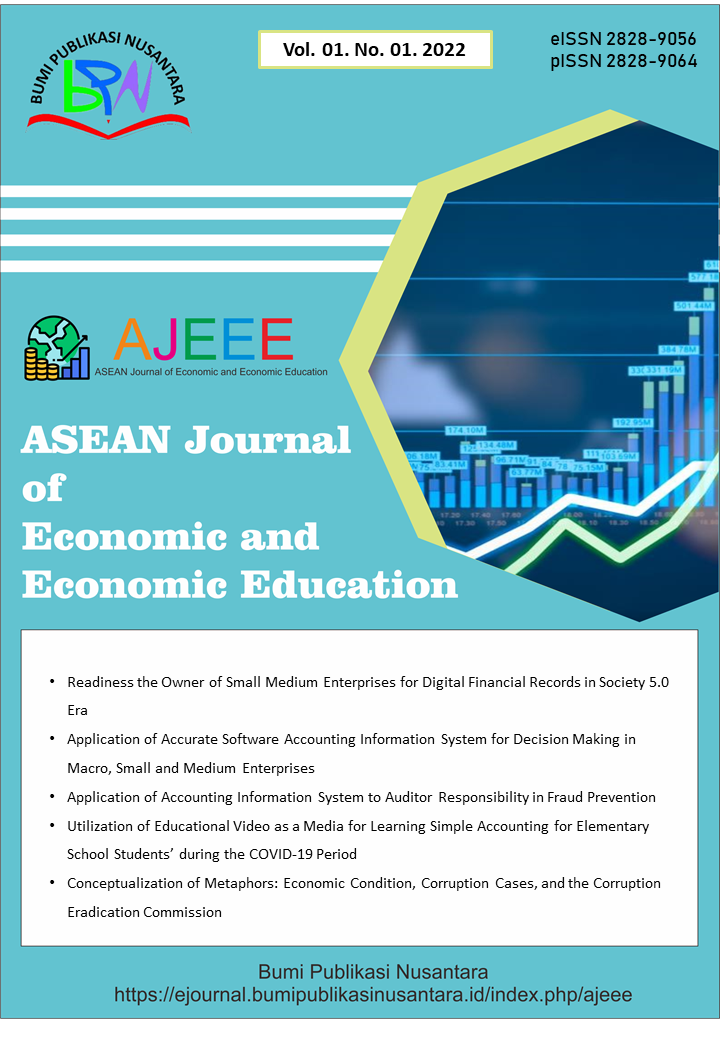Assessment Methodology Role of Family Entrepreneurship in The Sphere of Services
 ),
),
(1) Tashkent State University of Economics
 Corresponding Author
Corresponding Author
Abstract
Keywords
References
Anderson, R. C., and Reeb, D. M. (2003). Founding‐family ownership and firm performance: evidence from the SandP 500. The journal of finance, 58(3), 1301-1328.
Beehr, T. A., Drexler Jr, J. A., and Faulkner, S. (1997). Working in small family businesses: empirical comparisons to non‐family businesses. Journal of Organizational Behavior: The International Journal of Industrial, Occupational and Organizational Psychology and Behavior, 18(3), 297-312.
Blanco-Mazagatos, V., de Quevedo-Puente, E., and Castrillo, L. A. (2007). The trade-off between financial resources and agency costs in the family business: An exploratory study. Family Business Review, 20(3), 199-213.
Chikatueva, L., Nahushev, V., and Psikhomakhov, K. (2011). The role of small business in the socio-economic development of the region. Journal of Economics and Law, 12, 132-135.
Daily, C. M., and Dollinger, M. J. (1992). An empirical examination of ownership structure in family and professionally managed firms. Family Business Review, 5(2), 117-136.
De Vries, M. F. K. (1993). The dynamics of family-controlled firms: The good and the bad news. Organizational Dynamics, 21(3), 59-71.
Duh, M., Belak, J., and Milfelner, B. (2010). Core values, culture and ethical climate as constitutional elements of ethical behaviour: Exploring differences between family and non-family enterprises. Journal of Business Ethics, 97(3), 473-489.
Dyer Jr, W. G. (2003). The family: The missing variable in organizational research. Entrepreneurship Theory and Practice, 27(4), 401-416.
Gallo, M. A. (1995). The role of family business and its distinctive characteristic behavior in industrial activity. Family Business Review, 8(2), 83-97.
Gallo, M. A., and Sveen, J. (1991). Internationalizing the family business: Facilitating and restraining factors. Family Business Review, 4(2), 181-190.
Ignatova, I. V., and Ignatov, E. S. (2017). Razvitie predprinimatel'stva v regione: faktory i problemy. Jekonomicheskie I Social'nye Peremeny: Fakty, Tendencii, Prognoz, 5, 53.
Kelly, L. M., Athanassiou, N., and Crittenden, W. F. (2000). Founder centrality and strategic behavior in the family-owned firm. Entrepreneurship Theory and Practice, 25(2), 27-42.
Khidirova, G. (2018). The methods of identify impact of leading idustry on social-economical development. International Finance and Accounting, 2018(4), 15.
Kitula, A. G. N. (2006). The environmental and socio-economic impacts of mining on local livelihoods in Tanzania: A case study of Geita District. Journal of Cleaner Production, 14(3-4), 405-414.
Korolev, V. A. (2007). Rossijskij sobstvennik na 20 letnem gorizonte: struktura sobstvennosti, rol'sem'i i korporativnoe upravlenie. Rossijskij Zhurnal Menedzhmenta, 5(3), 145-174.
Kulik, A. A., Tokarenko, A. S., and Chernega, A. A. (2019). Sovremennoe sostojanie i perspektivy razvitija malogo i srednego predprinimatel'stva v Krasnodarskom krae. Jekonomika I Biznes: Teorija I Praktika, 10, (1), 197.
Liang, H., Ren, J., Gao, Z., Gao, S., Luo, X., Dong, L., and Scipioni, A. (2016). Identification of critical success factors for sustainable development of biofuel industry in China based on grey decision-making trial and evaluation laboratory (DEMATEL). Journal of Cleaner Production, 131, 500-508.
Lovkova, E., and Abramova, Yu. (2019). Rating Regions by Development Level of Micro-entrepreneurship. Bulletin of Science and Practice, 5(5), 314-323. (in Russian).
Morozova, E. A., Chelombitko, A. N., and Andreeva, L. M. (2012). Demographic situation and its impact on the socio-economic development of the region. Bulletin of KemSU, 2, 213-219.
Palvia, P., Baqir, N., and Nemati, H. (2018). ICT for socio-economic development: A citizens’ perspective. Information and Management, 55(2), 160-176.
Popova, G. L. (2016). A statistical analysis of the development of small business in the Tambov oblast. Regionalnaya Ekonomika: Teoriya I Praktika= Regional Economics: Theory and Practice, 14(12), 178-188.
Romano, C. A., Tanewski, G. A., and Smyrnios, K. X. (2001). Capital structure decision making: A model for family business. Journal of Business Venturing, 16(3), 285-310.
Vallejo, M. C. (2008). Is the culture of family firms really different? A value-based model for its survival through generations. Journal of Business Ethics, 81(2), 261-279.
Zhou, Q., Deng, X., and Wu, F. (2017). Impacts of water scarcity on socio-economic development: A case study of Gaotai County, China. Physics and Chemistry of the Earth, Parts A/B/C, 101, 204-213.
Zhuk, A. A., and Potiy, K. M. (2017). Phenomenon of family entrepreneurship in the modern economic theory. Russian Journal of Entrepreneurship, 18(19), 2891-2908.
Article Metrics
Abstract View : 1516 times
: 1516 times Download : 947 times
Download : 947 times
Refbacks
- There are currently no refbacks.
Copyright (c) 2022 Yayasan Bumi Publikasi Nusantara

This work is licensed under a Creative Commons Attribution-ShareAlike 4.0 International License.



_publication_ethics1.png)



